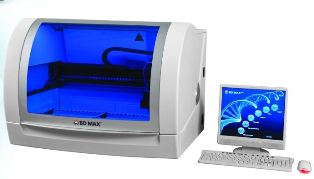BD Max benchtop rapid MRSA assay test launched in Europe
2 February 2012
BD Diagnostics has obtained EU approval for the BD MAX MRSA Assay to rapidly and accurately identify MRSA in patients.
BD MAX is a bench-top molecular system designed to perform a broad range of molecular testing. This offers laboratory professionals the flexibility and versatility to perform CE/in vitro diagnostic (IVD) assays and user defined protocols on the same platform.
Rapid and accurate information enables infection-control measures in hospitals to be implemented faster, which can positively impact patient management.

The benchtop BD Max MRSA Assay system
“When we launched BD MAX earlier this year, our goal was to provide a next-generation molecular testing system designed to accommodate a broad range of assays that laboratories want and need,” said Tom Polen, President, BD Diagnostics – Diagnostic Systems. “As the first healthcare-associated infection assay developed by BD for use on the BD MAX System, this milestone represents further confirmation of the potential of this fully-automated system. This system enables laboratories to offer a broad range of molecular tests that meet both their current and future clinical needs.”
"The challenge to fight healthcare-associated infections in Europe is resulting in an increased number of active surveillance programs for MRSA in a continually resource-constrained environment,” said Hilja Ibert, Vice President and General Manager, BD Diagnostics – Diagnostic Systems in Europe. “The BD MAX MRSA Assay on the BD MAX System provides significant laboratory efficiency and versatility to help address the increasing volume of molecular tests.”
The dual functionality of open system and CE/IVD capabilities on the BD MAX System enables laboratories to consolidate a broad range of molecular tests on a single workstation. This flexibility provides clinicians with the best information to make critical treatment and management decisions to improve patient care. According to Polen, BD plans to build on the successful launch by developing additional assays for a broad range of disease categories. There are now more than 20 assays in the pipeline.